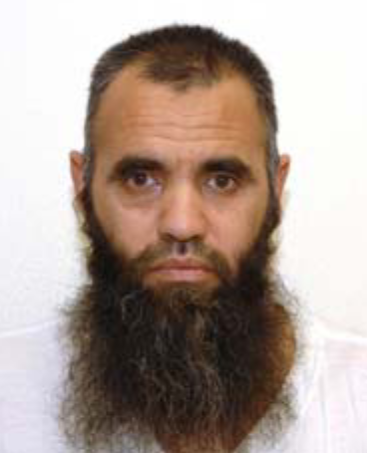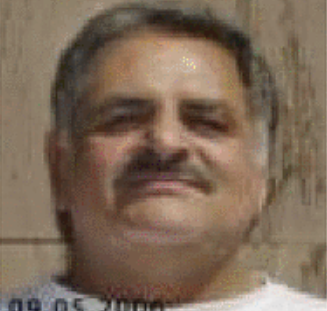
Getty/US government Ketanji Brown Jackson and two former Guantanamo Bay detainees she represented
Ketanji Brown Jackson, Joe Biden’s nominee to the U.S. Supreme Court, once defended Guantanamo Bay detainees as a federal defender.
Those clients have caused some controversy. U.S. Sen. Josh Hawley, a Republican, tweeted, “Enjoyed meeting today w/ Judge Jackson, Joe Biden’s #SupremeCourt nominee. Asked a lot of questions & have lots more, especially about her defense of Guantanamo Bay terrorists & on criminal justice. The hearings will be critical to understanding why she has taken these positions.”
Others have defended Brown Jackson, saying that everyone is entitled to a defense under the American system of government, and she had a duty to give her clients a vigorous defense.
Jackson serves on the U.S. Court of Appeals for the District of Columbia Circuit. According to NPR, she made President Barack Obama’s shortlist for U.S. Supreme Court in 2016.
Biden wrote on Twitter on February 25, 2022, “I’m proud to announce that I am nominating Judge Ketanji Brown Jackson to serve on the Supreme Court. Currently serving on the U.S. Court of Appeals for the D.C. Circuit, she is one of our nation’s brightest legal minds and will be an exceptional Justice.”
The Associated Press reported that Jackson was assigned the cases. The site reported that all of the men were eventually released, and none was convicted by military commissions.
According to Vox, Republicans have raised concern about these cases since at least 2021. “I have questions about your views on the rights of detainees, and that in turn causes some concern about how you will handle terrorism cases that may come before you if you are confirmed,” Sen. Charles Grassley (R-IA) said at a hearing then. She was a federal public defender from 2005 to 2007, according to Vox.
Here’s what you need to know about Brown Jackson’s Guantanamo Bay clients:
Khi Ali Gul

U.S. governmentKhi Ali Gul
In 2014, the U.S. government announced that it had repatriated Gul to Afghanistan. Vox reported that Jackson ” advocated for his right to challenge his imprisonment at Guantánamo Bay, Cuba.”
The court document filed in part by Jackson reads, “His detention is without lawful basis,without charge, and without access to counsel or any fair process by which he might challenge his detention.”
According to a government document in 2008 posted by The Miami Herald, the government alleged the following about Gul.
Detainee is assessed to be a member of an Anti-Coalition Militia (ACM) group named Union of Mujahideen (UOM)1 with indirect ties to the Haqqani Network.2 Prior to detention, detainee was previously a commander in the Gorbaz Mehdi Jihadi Battalion. Detainee planned and executed attacks against US and Coalition forces with the UOM. Detainee acted as an intelligence officer, gathered information, and created a list of Afghans helping US and Coalition forces in order
to engage them. Detainee was an intelligence officer for the Taliban and reportedly an agent for the Pakistan Inter-Services Intelligence Directorate (ISID)…Detainee’s work included transporting documents between Khowst and Kabul, AF for Uddin. Detainee also operated as an informant for the chief of the Khowst intelligence office, Uddin. Detainee would travel around Khowst and acquire information on local tribal disputes and report back to Uddin. Detainee also drove people around the city of Khowst. Detainee denied he ever worked for the Taliban or had any contact with them. Detainee claims the reason he did not fight is because his tribe collected money and paid the Taliban so they did not have to fight for the Taliban
During her confirmation hearing to the federal bench, she was asked, according to the written questionnaire, “While working as an Assistant Federal Public Defender, why did you choose to work on behalf of Guantanamo detainee Khi Ali Gul? If you did not have a choice as to whether working on behalf of this client, did you ever consider resigning from your position?”
She responded,
Between 2005 and 2007, as an employee of the Office of the Federal Public Defender in Washington D.C., I worked with other assistant federal public defenders to represent some of the individuals designated as enemy combatants who were detained by the federal government without charge or trial at the U.S. Naval Base in Guantanamo Bay, Cuba, and whose legal claims for relief were being litigated in the federal courts in the District of Columbia. The Federal Public Defender’s office in Washington, D.C., is a relatively small office, and to my knowledge, the U.S. District Court for the District of Columbia was the exclusive venue in which the legal claims of Guantanamo Bay detainees were being reviewed.
Khi Ali Gul was one of the individuals whom the D.C. Federal Public Defenders’ office represented, and in my role as an Assistant Federal Public Defender, I drafted various motions, and worked on other court filings on his behalf.
At the time of this representation, my brother was an enlisted U.S. Army infantryman who was deployed outside of Mosul, Iraq, and I was keenly and personally mindful of the tragic and deplorable circumstances that gave rise to the U.S. government’s apprehension and detention of the persons who were secured at Guantanamo Bay. In the wake of the horrific terrorist attacks in September of 2001, I was also among the many lawyers who were keenly aware of the threat that the 9-11 attacks had posed to foundational constitutional principles, in addition to the clear danger to the people of the United States.
Under the ethics rules that apply to lawyers, an attorney has a duty to represent her clients zealously, which includes refraining from contradicting her client’s legal arguments and/or undermining her client’s interests by publicly declaring the lawyer’s own personal disagreement with the legal position or alleged behavior of her client. Because these standards apply even after termination of the representation, it would be inappropriate for me to comment on whether I disagreed with Khi Ali Gul, found his alleged crimes offensive, or considered resigning my position as an Assistant Federal Public Defender based on any such disagreement or offense.
Jabran al Qahtani
In 2017, the U.S. government announced that al Qahtani was being transferred to Saudi Arabia.
According to AP, Jackson represented Jabran al Qahtani, who “traveled from his home in Saudi Arabia to train and fight against American forces and others in Afghanistan.”
A 2016 governmental profile on him published by The New York Times reads:
Al-Qahtani ( SA – 696 ) is a self- radicalized electrical engineer who traveled from Saudi Arabia to Afghanistan in October 2001 to fight against US forces in Afghanistan . He received abbreviated weapons training at an al- Qa’ida camp in Afghanistan and was selected by a senior al – military commander to receive explosives detonator training in Faisalabad, Pakistan. There, he learned to construct circuit boards for radio -remote controlled improvised explosive devices with the intention of teaching bomb making techniques to operatives attacking US and Coalition forces in Afghanistan. SA -696 was captured by Pakistani authorities on 28 March 2002 at senior al Qa’ida facilitator Abu – 10016) safehouse in Faisalabad, Pakistan, five months after leaving Saudi Arabia.
That document quotes his representative as saying,
Jabran has been a compliant detainee with a relatively low number of infractions since his arrival at Guantanamo Bay and has taken advantage of the communal livingopportunity here at the detention facility. He earned an electrical engineering degree from King Saud University and comes from a large close-knit family of educators, government workers, and small business owners. Additionally, over the past 14 years, Jabran has attended art, computer skills, and English courses offered at the camp.
Khudai Dad
Khudai Dad was another Jackson client, according to AP. The Associated Press reported that he was sent back to Afghanistan within three months.
In 2006, a New York Times article described a quote from Dad: “Another prisoner from Uruzgan province, Khudaidad, a laborer who uses only one name, said his American guards would withhold medicines at times, and would sometimes serve bad food as a form of punishment.”
You can see his WikiLeaks file here.
Tariq Mahmoud Ahmed Al Sawa

US GovernmentAl Sawah
Tariq Mahmoud Ahmed Al Sawa was another Jackson Client, AP reported.
According to the Associated Press, the U.S. government has described Al-Sawa “as an explosives expert for al-Qaida, the terrorist group that carried out the 9/11 attacks.” He was released in 2016 to Bosnia and Herzegovina.
A government document says that the detainee was an “admitted member of al-Qaida who developed specialized improvised explosive devices (IEDs) for use against US military forces and civilians. These IEDs included the limpet mine to sink US naval vessels and the prototype for the shoe-bomb used in a failed attack on a civilian transatlantic flight. Prior to detention, detainee admitted teaching explosives at the al-Qaida advanced training camp… where Usama Bin Laden personally praised detainee for his ‘good work.’”
READ NEXT: Leila & Talia Jackson, Judge Ketanji Brown Jackson’s Daughters
